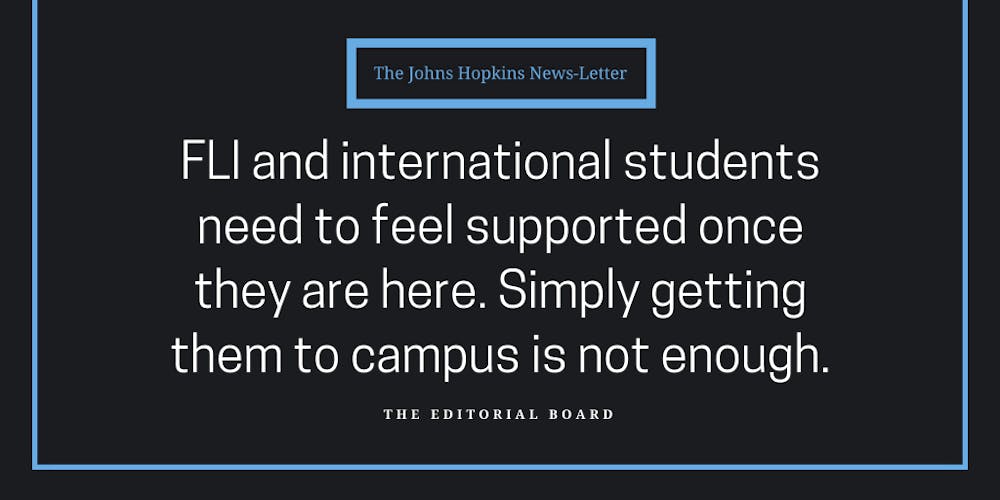We all remember our first week of freshman year. Nervous and cautious, we moved into our dorms, met our roommates and wandered around campus and Baltimore for the first time.
For many of us, the transition to college life was difficult. For first-generation, limited-income (FLI) students and international students, however, that transition can be even more complex. The University has made commendable efforts to provide additional support. We question, however, whether it has done enough.
In 2017, the Council for Opportunity in Education and the Center for First-generation Student Success held the inaugural National First Generation College Student Day. This year, Hopkins will join many other colleges and universities around the country on Friday, Nov. 8 to celebrate the day with food and festivities on Keyser Quad.
This day comes almost one year after Michael Bloomberg made his staggering $1.8 billion donation to the University. As a result of this donation, the University is able to permanently conduct need-blind admissions and offer scholarships in place of student loans.
Over the past semester, we’ve seen the University making strides to establish a more supportive environment for FLI students. A new Pre-Orientation program called Envisioning Your Future, specifically for FLI freshmen and transfer students, was introduced in August. This program aims to reinforce the idea that FLI students belong on campus just as much as all other students. It also aims to provide them with opportunities to connect with other FLI students, as well as campus resources like financial aid.
Over the summer, Hopkins hired social worker Tiffany Llewellyn, who works at the Counseling Center to support FLI students dealing with imposter syndrome. Additionally, Alayna Hayes, senior director of life design at the University’s Life Design Lab, will start helping FLI students network and explore careers in mid-November.
We are glad that Hopkins has made progress with FLI programs. These programs give us hope that future FLI students at Hopkins will feel more welcome and supported. In particular, FLI freshmen and sophomores have praised these programs.
The assistance and recognition that many freshmen and sophomores have received, however, has been largely absent for upperclassmen. The University should do more to support FLI juniors and seniors, many of whom have helped shape these programs.
Like their FLI peers, international students have more to adjust to at Hopkins. International students have to not only navigate a new campus and city, but also an entirely new country — one that has not been particularly welcoming of foreigners in recent years. Having to adjust to a new country is intimidating. Doing so with very little support in making the transition is downright terrifying. And unfortunately, that is the reality many international students face.
There are many hurdles international students face: the lack of a Social Security number, complications with taxes and confusion over things as simple as American phone plans. Some international students struggle with overcoming language barriers and cultural divides. According to student sources, Hopkins does very little to assist with these challenges. Without guidance from the University, international students face constant barriers and frustrations.
At Hopkins, the Office of International Services (OIS) is responsible for providing international students with the additional support they need. Thus far, OIS has fallen short. While the Office’s website provides guides on visas and immigration, there is little information on how the University supports these students once they arrive on campus.
Lack of support for international students is not a problem exclusive to Hopkins. Still, some of our peer institutions have already implemented resources that are feasible for Hopkins to implement. Columbia University, for example, has a detailed website run by the International Students & Scholars Office. The website includes a general guide for everything students might need to know about Columbia and New York City, from the weather displayed in both Celsius and Fahrenheit to guides on opening bank accounts and tipping. The website also links to a page called “Your First Week,” which describes how international students can acclimate to life at Columbia. Meanwhile, the Office of Career Services at Harvard University has a resource guide specifically for international students with information about finding jobs and internships.
Hopkins has made significant progress in developing its FLI programs. It has not been doing enough, however, for its international students. OIS does not help international students assimilate or give them a sense of community — they provide help with paperwork.
In recent years, the University has become more inclusive of international and FLI students.
According to Kelly Barry, executive director for student success, 21.4 percent of Hopkins undergrads are FLI students. The percentage of international students has risen from eight to 14 percent from the Class of 2020 to the Class of 2023. Given that international student enrollment in U.S. colleges has decreased in recent years under the Trump administration, this is a notable increase.
Still, it is important for the University to go beyond increasing enrollment. FLI and international students need to feel supported once they are here. Simply getting them to campus is not enough.
That being said, making our campus a more inclusive environment is not a responsibility that lies solely with our administrators. It lies with the student body. As students, we must be mindful of the privileges we have. We must be responsible for making our peers feel welcome at Hopkins, no matter their background.
Editor’s note: A FLI student and an international student were on this week’s Editorial Board.





